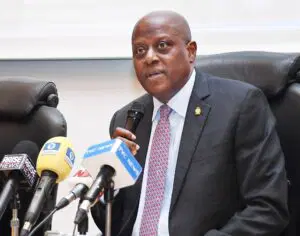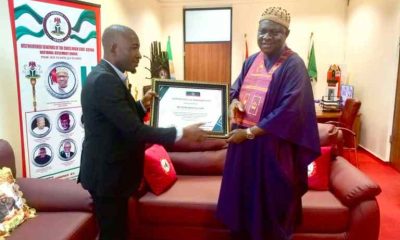Business
TCN: Coalition Debunks Corruption Allegation Against Engr. Sule Abdulaziz

A coalition of over 180 Civil Society Organisations in Nigeria, Civil Society Groups for Good Governance, CSGGG has debunked and exonerated the management of the Transmission Company of Nigeria, TCN of any corruption and underhand dealings.
Addressing newsmen in Abuja on Tuesday, the convener of CSGGG, Comrade Ogakwu Dominic, expressed concern over the accusations circulating against the management of the Transmission Company.
“As CSOs, we are duty-bound to investigate any information we receive and ensure none are unjustly punished without appearing sentimental, self-seeking, or unpatriotic.
“We have engaged the management of TCN, and it is on record that the MD/CEO is a man who has instilled a standing and verifiable tradition of prudent management of scarce resources, leading to notable achievements.
“These accomplishments will soon become visible as part of the Renewed Hope Agenda of the current administration, as the decades of rot in the sector can not be wished away overnight,” he said.
Dominic said the allegations revolve around claims made by an online news outlet, suggesting that TCN’s managing director purchased an exotic car for the Hon. Minister of Power as a bribe.
He, however, said TCN management clarified that the vehicle was procured as part of official responsibilities to support the minister’s office.
He further highlighted the challenges facing TCN, including disruptions caused by bandits, gas supply shortages, and unethical conduct by generation and distribution companies.
“We urge Nigerians to proffer solutions to the problems facing the power sector rather than politicizing them,” he said.
Ogakwu emphasized that the continuous harassment of TCN’s management is taking an unpatriotic turn. He cautioned against unjust intimidation and harassment, advocating for transparency and adherence to due process.
He said, President Bola Ahmed Tinubu’s endorsement of Engr. Sule Abdulaziz’s continuation in the office reflects a commitment to professionalism and diligence in the power sector.
“We commend and urge the management of TCN to remain committed to fast-tracking solutions to the challenges bedevilling the power sector,” he said.
The organisation’s stance underscores the need for collaborative efforts to address Nigeria’s power sector challenges and achieve stable electricity supply for all citizens.
Business
We need strong, resilient banks to achieve $1trn economy — CBN

The Central Bank of Nigeria (CBN) has reaffirmed the need for strong, stable, and resilient banks to achieve President Bola Tinubu’s target of a $1 trillion economy by 2030.
Speaking at the 36th CBN Seminar for Finance Correspondents and Business Editors held in Abuja, Deputy Governor of Corporate Services, Ms. Emem Usoro, emphasised that ongoing efforts to recapitalise banks are a vital step in realising this goal. Represented by Acting Director of Corporate Communications, Mrs. Hakama Sidi-Ali, Usoro said bank recapitalisation will empower financial institutions to fund large-scale projects and compete globally.
“As we work towards building a one-trillion-dollar economy, we must consider the recapitalisation of our banks to finance and power the economy,” she said. “Banks must be strong enough to support development projects and effectively carry out financial intermediation.”
She added that Nigeria’s current GDP stands at around $250 billion, indicating a significant gap that would require strategic planning, consistent policy direction, and the full engagement of economic stakeholders.
The global financial architecture, she noted, has evolved, particularly since the Trump administration in the U.S., making it crucial for Nigerian banks to align with global opportunities and risks through responsive policies.
In his presentation, Director of Banking Supervision at the CBN, Dr. Olubukola Akinwumi, explained that the recapitalisation strategy now focuses on helping banks meet their Cash Reserve Requirement (CRR) obligations and participate in infrastructure financing.
He said, “A well-capitalised bank can support large transactions and benefit from government initiatives such as infrastructure concessions. Stronger banks can lend more, especially to priority sectors like agriculture, manufacturing, and SMEs, which are engines of growth.”
Akinwumi stressed that these sectors remain central to the government’s development plans, as reflected in the 2025 national budget, which prioritises education, health, agriculture, and infrastructure.
Adding an industry voice, UBA Managing Director, Mr. Oliver Alawuba, urged greater trust in Nigerian banks, suggesting that part of the country’s external reserves be managed locally to build confidence and boost economic growth.
“We manage the reserves of other African countries. Nigerian banks should be trusted with at least 10 to 20 percent of our own reserves,” he said.
However, Alawuba raised concerns about the feasibility of reaching the $1 trillion goal, citing Nigeria’s current annual growth rate of 3.8 percent—far below the 10 percent minimum required to meet the target by 2030.
He called for synergy between fiscal and monetary authorities to support the financial sector in driving sustainable economic transformation.
Business
Crude oil price crashes, puts 2025 FG revenue target in jeopardy

The price of Bonny Light, Nigeria’s premium crude oil grade, dropped by 5.09 percent to $59.62 per barrel on Wednesday, amid rising tensions from the ongoing global tariff war sparked by recent tariff hikes announced by the United States.
The downward trend in oil prices was further compounded by the Organisation of Petroleum Exporting Countries (OPEC) and its allies’ decision to raise oil production by 411,000 barrels per day starting in May 2025.
The price plunge comes as a major concern for Nigeria, whose N54.99 trillion 2025 national budget is predicated on a benchmark oil price of $75 per barrel and a production target of 2.06 million barrels per day (bpd). Current output, including condensates, stood at 1,671,953 bpd as of February 2025, according to the Nigerian Upstream Petroleum Regulatory Commission (NUPRC).
Speaking to Vanguard, Dr. Muda Yusuf, CEO of the Centre for the Promotion of Private Enterprise (CPPE), described the situation as a “serious problem.” He warned that the decline could severely impact government revenue and weaken the exchange rate.
“This poses a risk to our revenue and foreign exchange earnings. We all know the implications of a weak exchange rate on the economy,” Yusuf said.
Despite the broader economic risks, lower crude prices may offer relief at the pump for Nigerian consumers. Findings by Vanguard indicate that domestic petrol prices may fall as downstream operators prepare for a likely reduction in Premium Motor Spirit (PMS) prices.
Ehimen Joseph, Chairman of the Lagos State Chapter of the Petroleum Products Retail Outlet Owners Association of Nigeria (PETROAN), told Energy Vanguard, “This should be expected in a deregulated market. If the fall in crude oil prices persists, it would affect pricing along the entire value chain.”
Another industry source, who requested anonymity, said: “Everything is pointing towards a pump price reduction this week. One of the refineries has stopped issuing petrol tickets, anticipating a price review before Tuesday.”
Depot prices have already begun to reflect the trend. Data from petroleumprice.ng shows declines across major players: Mainland dropped from N920 to N918 per litre, A.Y.M from N920 to N919, and Ever from N920 to N918. Prudent, Eterna, and Soroman also saw slight reductions, with Eterna dropping from N900 to N897 per litre.
Meanwhile, OPEC has reaffirmed its commitment to monitoring the global oil market. A recent virtual meeting of eight OPEC+ countries—Saudi Arabia, Russia, Iraq, UAE, Kuwait, Kazakhstan, Algeria, and Oman—held on April 3, 2025, reviewed market conditions and reaffirmed output increases to stabilize global supply.
The situation continues to evolve, with both global market forces and domestic economic managers under pressure to adapt quickly to the unfolding realities.




















